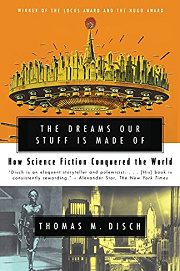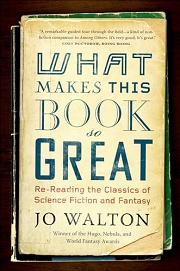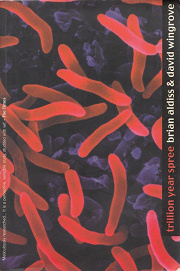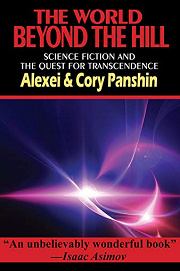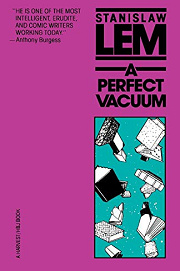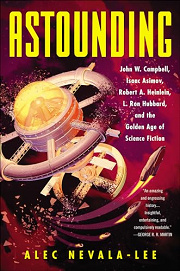Share your thoughts in a quick Shelf Talk!
The Dreams Our Stuff Is Made Of by Thomas M. Disch
How did science fiction shape the American imagination—and how did America reshape it in return? With sharp wit and fearless insight, The Dreams Our Stuff Is Made Of traces the genre’s tangled roots in politics, technology, and pop culture, inviting readers to see familiar stories—and the future itself—with startling new clarity.
Have you read this book? Share what you liked (or didn’t), and we’ll use your answers to recommend your next favorite read!
Love The Dreams Our Stuff Is Made Of but not sure what to read next?
These picks are popular with readers who enjoyed this book. Complete a quick Shelf Talk to get recommendations made just for you! Warning: possible spoilers for The Dreams Our Stuff Is Made Of below.
In The Dreams Our Stuff Is Made Of, did you enjoy ...
... acerbic, witty criticism that pokes at SF’s sacred cows and celebrates its oddities?
What Makes This Book So Great by Jo Walton
If you grinned when Disch skewered Heinlein’s libertarian streak or needled the grandiosity around classic franchises like Star Trek, you’ll love Walton’s lively, opinionated essays. She riffs on everything from Samuel R. Delany’s Nova to Lois McMaster Bujold’s Miles Vorkosigan books with the same mix of admiration and sharp elbow-jabs Disch uses when he revisits the New Wave. It’s a smart, affectionate, and often very funny tour through the genre’s triumphs and blind spots—perfect if you enjoyed the sting beneath the smiles in The Dreams Our Stuff Is Made Of.
... a sweeping, argumentative history of SF from Mary Shelley through cyberpunk?
Trillion Year Spree: The History of Science Fiction by Brian W. Aldiss and David Wingrove
Disch’s big claims—like his bracing takes on the New Wave’s cultural import or his barbed reassessments of Golden Age mythmaking—find a fantastic counterpoint in Aldiss’s grand thesis that SF really begins with Frankenstein. You’ll get deep dives on Wells, Stapledon, Heinlein, and beyond, the same way Disch links authors to their political and cultural contexts. If you liked how Disch connected ideas and eras into a cohesive argument, this book delivers that same heady, line-crossing intellectual charge.
... a grand-scale genealogy of SF’s ideas and its quest for transcendence?
The World Beyond the Hill by Alexei Panshin and Cory Panshin
Where Disch ranges from Campbell’s editorial empire to L. Ron Hubbard’s curious afterlife, the Panshins chart the field’s evolution from early romance through the Campbellian revolution with panoramic detail. Their portraits of figures like A. E. van Vogt, Asimov, and Heinlein echo Disch’s willingness to reframe legends, but on an even broader canvas. If you enjoyed the way The Dreams Our Stuff Is Made Of sweeps across decades to show how cultural tides shaped SF, this delivers that epic, integrative scope.
... sharp, playful metafiction that anatomizes speculative ideas via faux critical reviews?
A Perfect Vacuum by Stanislaw Lem
Disch dismantles genre myths and authorly pretensions; Lem dismantles entire imaginary books. His faux reviews—like the withering take on “Les Robinsonades” or the send-up of encyclopedic epics in “Gigamesh”—savagely parody academic criticism and SF tropes much like Disch’s wry autopsies of Hubbard or his sideways jabs at cyberpunk bravado. If you relished Disch’s meta-arguments about what stories mean and how they’re sold to us, Lem’s ingenious, caustic thought experiments are catnip.
... the messy power dynamics and gatekeeping behind Campbell’s Golden Age and its stars?
Astounding: John W. Campbell, Isaac Asimov, Robert A. Heinlein, L. Ron Hubbard, and the Golden Age of Science Fiction by Alec Nevala-Lee
Disch’s chapters on the field’s politics—his frank talk about Campbell’s influence and the strange orbit of L. Ron Hubbard—set you up perfectly for this deeply reported history. You’ll see editorial power shaping Asimov and Heinlein, the fallout from pseudoscience and ideology, and how the “Golden Age” was built by human choices and compromises, not just genius. If you appreciated how The Dreams Our Stuff Is Made Of interrogates who gets to steer SF, Astounding takes you into the engine room.
Unlock your personalized book recommendations! Just take a quick Shelf Talk for The Dreams Our Stuff Is Made Of by Thomas M. Disch. It’s only a few questions and takes less than a minute.
